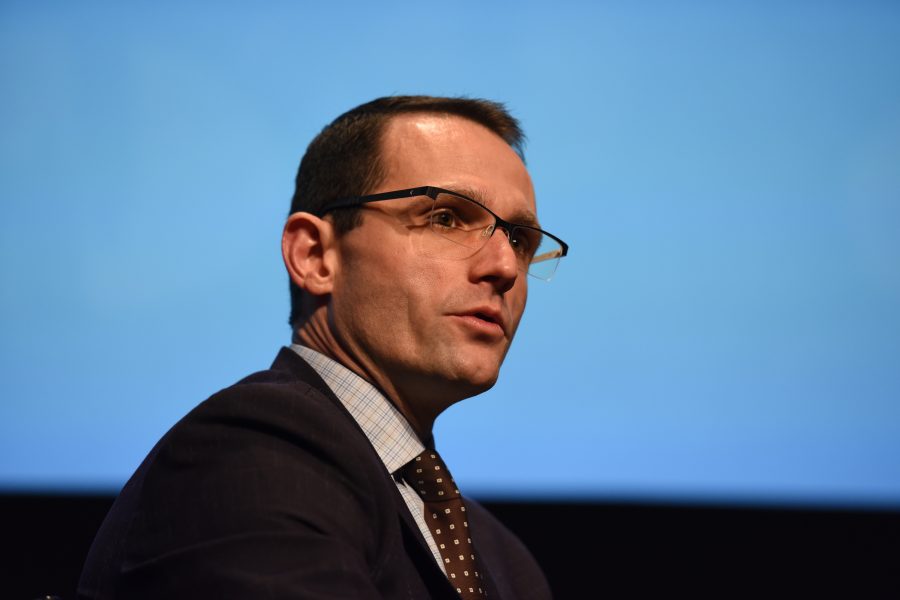The Air Force’s former acquisition boss has landed a new job as the CEO of a Silicon Valley-backed startup specializing in many of the same technologies he championed during his time with the service.
Will Roper was announced as the new chief executive officer of Volansi, a logistics and drone building company, July 8. He had joined the company’s board of directors in March after leaving his job as Assistant Secretary of the Air Force for acquisition, technology, and logistics in January.
In an interview with Air Force Magazine, Roper acknowledged that Volansi, which was founded in 2015, is still something of a “dark horse” in the industry. But in deciding his next move after leaving the Pentagon, he cited his desire to work on the same problems and opportunities that interested him in the Air Force.
“This aerial logistics mission is one I have been watching since Amazon first showed that video of delivering packages on people’s doorsteps,” Roper said. “I have been waiting to harness this for the military, [but] it has not been mature at any time that I have been in service.
“And it was just coming together when I was leaving, creating the Agility Prime program to get these electric vehicles that take off vertically, then fly linearly like traditional airplanes, to get them ready for primetime, by using the military as a springboard. But, I didn’t have the time to complete that journey on the government side, and it just happens to be that I’ve been given a chance to follow the journey on the commercial side.”
Agility Prime, aimed at accelerating the commercial market for flying cars, was one of Roper’s signature programs as acquisition chief, as he developed a reputation as a fast-moving innovator who pushed the military to engage with nontraditional partners and develop far-reaching future technologies.
And Volansi was one of the first Silicon Valley-backed private partners to engage with the Air Force, Roper said. The company debuted its VOLY M20 drone, designed in part for military use, at the Air Force’s Agility Prime Virtual Trade Show in May 2020, and it signed a contract with the Department of Defense in December 2020 as part of the Skyborg Vanguard program.
Both the Skyborg and Agility Prime programs are ones Roper said he wants to continue to engage with at Volansi. But he also expressed an interest in working with the military in other ways. Specifically, Roper said he hoped Volansi would be able to help the Navy with rapid ship-to-ship and ship-to-shore deliveries and the Army with tactical logistics, providing units with everything from batteries to ammunition to food to medicine on the battlefield.
In working with the military and other defense partners, Roper said Volansi plans later this year to unveil bigger drones capable of carrying heavier payloads—the VOLY M20, the company’s largest drone, can carry 20 pounds of cargo and 10 pounds of ISR sensors with a range of 350 miles. Specifically, Roper said he thinks the company will release two more drone models, both heavier than the M20.
Drones, however, are only part of what attracted Roper to Volansi. The company has its own operating system and software necessary for autonomous takeoffs and landings. It also uses concepts such as digital engineering, incorporating real-time flight data, and predictive maintenance.
Those same technological advances were ones Roper advocated for in the Air Force, and they are as key to Volansi’s future as the actual drones are, he said.
“I think the thing that’s really understated is the software and autonomy in the company,” Roper said. “If you got rid of all the drones, it’s still probably a viable company, and that’s unusual to say for a drone company. They have the only vertically integrated avionics autopilot and autonomy stack that I have seen in the retail space. Almost everything comes from China. And I’m seriously considering licensing that software so that other companies can accelerate in the U.S. in the retail space so that the U.S. dominates this market.”
Translating capabilities across missions is key to Roper’s vision for Volansi—the usefulness of autonomous VTOL drones can apply to situations as varied as disaster relief to frontline warfare. In those scenarios, the military can lead the way, Roper said.
“It all dovetails very well with a military mission that can lead the charge before we spin off commercially. … Our main ambitions are commercial. It just so happens that working with the military seems to be a pretty good dress rehearsal for getting us ready to go there,” he said.
And while Roper’s tenure at Volansi is just beginning, he didn’t rule out the possibility of a future return to the Pentagon, especially if he knows the person asking him to take the job.
“If it was a job where I thought I could help, then of course I would. And if I’m not asked, then, you know, I also have found that there are lots of ways I can support the mission in the private sector,” Roper said.
“I think you might be able to argue that I might be able to have a little bigger impact, at least for a short amount of time, in the private sector, because I can do things here that I simply couldn’t do inside of the government. I’m going to learn a lot. I’m going to grow a lot. And then if I ever find myself back inside the five-sided building, I’ll be a much more well rounded leader that has learned more. So however the chips fall, I’ll be ready to make a contribution on one side or the other.”
